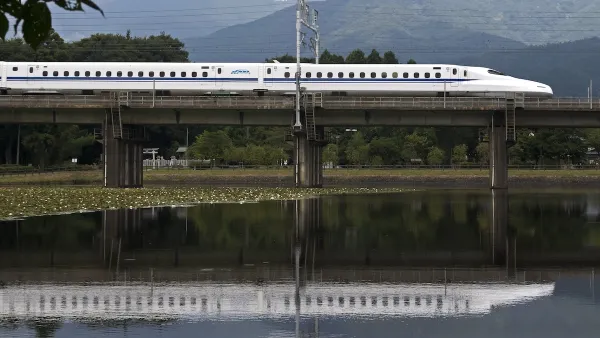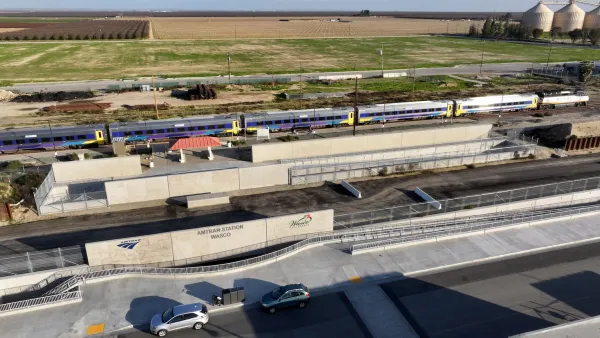Guidelines attached to the federal funds intended to help pay for the first phase of California's bullet train will require the fastest rate of transportation construction known in U.S. history, reports Ralph Vartabedian.
"The bullet train track through the Central Valley would cost $6 billion
and have to be completed by September 2017, or else potentially lose
some of its federal funding. It would mean spending as much as $3.5
million every calendar day, holidays and weekends included - the fastest
rate of transportation construction known in U.S. history, according to
industry and academic experts," writes Vartabedian.
To put that rate of spending into context, Vartabedian reports that other oft-cited examples of agreesive construction - the new Bay Bridge in Oakland and the Alameda Corridor freight rail line in Los Angeles - only managed to burn through $1.8 million per day.
"If the rail authority runs into technical problems, legal disputes,
permit delays or political roadblocks, it could end up building less
track and potentially leave an uncompleted project, according to
warnings contained in its own business plan. If the project blows past
the federal deadline, for example, the flow of money could be stopped.
And the scramble to meet that deadline could lead to construction
problems and drive up costs."
FULL STORY: High-speed spending: Bullet train may need $3.5 million a day

Planetizen Federal Action Tracker
A weekly monitor of how Trump’s orders and actions are impacting planners and planning in America.

Restaurant Patios Were a Pandemic Win — Why Were They so Hard to Keep?
Social distancing requirements and changes in travel patterns prompted cities to pilot new uses for street and sidewalk space. Then it got complicated.

Map: Where Senate Republicans Want to Sell Your Public Lands
For public land advocates, the Senate Republicans’ proposal to sell millions of acres of public land in the West is “the biggest fight of their careers.”

Orange County, Florida Adopts Largest US “Sprawl Repair” Code
The ‘Orange Code’ seeks to rectify decades of sprawl-inducing, car-oriented development.

Maui's Vacation Rental Debate Turns Ugly
Verbal attacks, misinformation campaigns and fistfights plague a high-stakes debate to convert thousands of vacation rentals into long-term housing.

San Francisco Suspends Traffic Calming Amidst Record Deaths
Citing “a challenging fiscal landscape,” the city will cease the program on the heels of 42 traffic deaths, including 24 pedestrians.
Urban Design for Planners 1: Software Tools
This six-course series explores essential urban design concepts using open source software and equips planners with the tools they need to participate fully in the urban design process.
Planning for Universal Design
Learn the tools for implementing Universal Design in planning regulations.
Heyer Gruel & Associates PA
JM Goldson LLC
Custer County Colorado
City of Camden Redevelopment Agency
City of Astoria
Transportation Research & Education Center (TREC) at Portland State University
Camden Redevelopment Agency
City of Claremont
Municipality of Princeton (NJ)





























